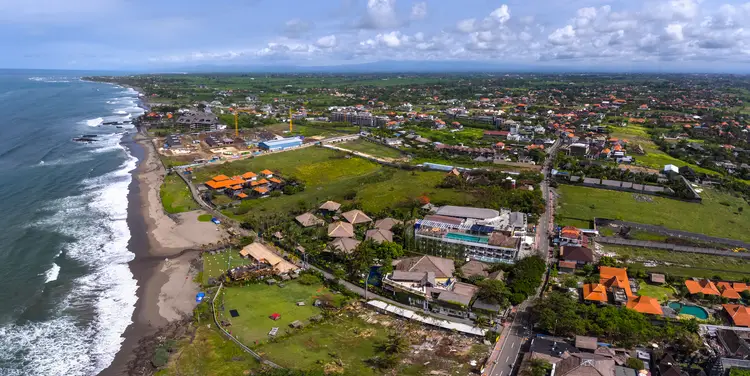“I have always had a special connection to Bali,” says Daisy McCloud. “I spent a good portion of my childhood here. It’s where I learned to swim, spent countless afternoons at the beach, and made many of my formative memories.”
Daisy was born an expat. Back in the 1980s, her parents did something unthinkable at the time and relocated from Canada to Indonesia, starting a family shortly after they arrived. Daisy and her sisters, all born in Asia, spent their early years in Bali before the family moved again. But they all continued to visit the island, and a decade ago Daisy returned here to live full-time.
Among world travelers, Bali has an almost mythical reputation. It has compelled people for decades with its phenomenal natural beauty, fascinating culture, and general affordability. Something about the island called Daisy back. She settled into Canggu, a funky area on Bali’s southwest coast, and has been there ever since.
Canggu is a unique neighborhood. It’s in the sweet spot between old and new, local and international, traditional and trendy.
Balinese people have lived here for generations, but then surfers started to visit in the 1970s and 80s. They were attracted by the pristine waves at beaches like Batu Bolong, Echo Beach, and Pererenan. As has happened so many places around the world, the surfers paved the way for other expats and eventually Canggu became a busy, ever-growing international community of interesting people.
Today, Canggu is known as the Brooklyn of Bali for its alternative undercurrent, eclectic community, and beach-bar buzz. One of the best parts about living here, according to Daisy, is enjoying the results of people’s creativity combined with the entrepreneurial atmosphere, especially when it comes to food.
“This is a foodie’s paradise,” she says. “I happily spend a lot of my downtime trying new places to eat or have a drink and hang out. The selection is massive and includes gourmet-level cuisine. There’s everything from breakfast joints serving Norwegian pastries and cold brew coffee to Italian restaurants serving handmade pasta and pizza. Plus, of course, you have local restaurants and food stalls serving Indonesian staples like nasi goreng (fried rice). Eating out is affordable enough that I can enjoy this indulgence a couple of times per week. In fact, it’s often more affordable to eat out then to buy your own ingredients and make meals yourself at home.”
The variety of the dining options reflects the diversity of Canggu’s expat community. There are Australians, Kiwis, Koreans, Canadians, Americans, Japanese, Germans, Argentines, and many other nationalities.
“The best way to get the scoop on what’s going on is to visit one of the many expat web pages or online forums,” says Daisy.
Visiting the various farmers’ markets is one of her top pastimes. Each has a different focus. Some sell clothes, some produce, some handicrafts. All are meeting places for the community and great for people-watching. There are also open-mic nights, salsa classes, beach clean-ups, happy hours, and other community events. It’s easy to make connections and settle into the expat community in Canggu.
“There are big, active sub-cultures based on different interests,” Daisy says. “The health and wellness sub-culture, for example, is huge and backed by a massive community of yogis and vegans. Concepts like green living have been introduced by expats and whole-heartedly incorporated into life in Canggu. It’s not uncommon to find a group of expats and locals doing beach clean-ups, advocating for reduced plastic use, or volunteering any day of the week.
“Deus Ex Machina and the bars around Echo Beach are the hub for surfers. The many funky cafés and co-working spaces have made Canggu the stomping grounds for digital nomads.”
Whatever your interests, you’ll likely find a corresponding community in Canggu. You can use your interest, hobbies, and pastimes to make connections. With the variety of things to do, expats enjoy active, well-rounded lifestyles here.
Daisy says, “Most weekends, I’ll do some physical activity, whether it’s surfing, playing padel, cycling, or doing a class. Hash House Harriers has a chapter here, and they often run along secret trails through the rice paddies, which is amazing. Around sundown, I might head down to the beach to meet some friends and catch the sunset. We usually go out for dinner. There’s always somewhere new to try.”
Beyond Canggu, Bali has much more to offer. Its landscape is rich, with three volcanoes, dense rain forest full of exotic animal species, rivers, waterfalls, lakes, hot springs, jagged cliffs, and beaches with sands of various colors. Underwater, the world is even more colorful and exciting, legendary among scuba divers and snorkelers for its colorful coral and abundant marine species. The natural bounty creates opportunity for all kinds of outdoors-based activities, from whitewater rafting and sportfishing to hiking and mountain biking.
One of Daisy’s favorite aspects of living on Bali is that regardless which neighborhood you settle into you’re living shoulder-to-shoulder with the locals, experiencing their culture. It’s evident in the colorful street processions that take place almost daily, the way people dress, and the ubiquitous scent of incense and sound of gamelan music.
“It sounds cliché,” says Daisy, “but the locals here are some of the nicest in the world. Despite the rapid change Bali has experienced, they’re light-hearted and welcoming.”
Bali’s cultural heritage coexists serenely with all the people of different backgrounds who have settled here.
Bali’s other major draw is its affordability. Costs for rent, utilities, and transportation are all lower than in North America.
“I rent a small villa on the fringes of Canggu, about a mile-and-a-half from the beach,” she says. “It has two bedrooms, two bathrooms, and two living rooms spread across two stories. Plus, it has amazing views over rice paddies and a small pool and garden. I don’t take my living situation for granted. There aren’t many other places in the world where a twenty- or thirty-something person can afford this kind of rental, plus employ household staff like a gardener and a cleaner.
“Balinese architecture is beautiful on its own, but when you combine it with modern twists and the natural beauty of Canggu, it’s really hard to beat. Most houses feature indoor-outdoor living concepts. They’re designed to incorporate nature, so you might have an outdoor shower surrounded by tropical plants and flowers or one of the walls of your living room might be floor-to-ceiling accordion glass doors that you can fold away when you want to.”
Life on Bali has its downsides, of course. From a North American’s perspective, it’s small and far away. Island fever can set in if you’re used to the freedom to roam far and wide. Traffic is an issue. The motorbike is the king of local transportation, and, despite how nimble they are, they often clog the island’s arteries.
Bali is constantly changing. From one year to the next, an area can be transformed from a sleepy traditional village to a booming hub of commerce and tourism. Development is often rapid and not always respectful of the natural beauty.
“I’ve had a front row seat to Bali’s transformation over the past thirty-odd years. The island has changed so much. I recognize my role in this as a foreigner,” says Daisy.
Yet, amidst all this change, Bali continues to be a wonderful place to spend time. It’s a tropical playground for people of all ages where you can live a high-end lifestyle on a modest budget while connecting with a fascinating local culture that will enrich and reward you.
Until next time,
Kathleen Peddicord
Founding Publisher, Overseas Opportunity Letter












